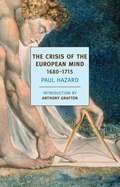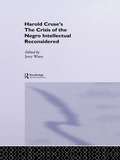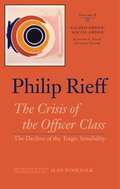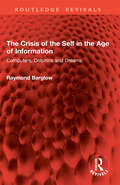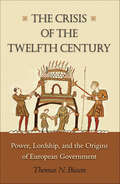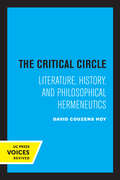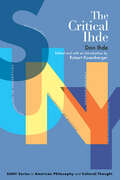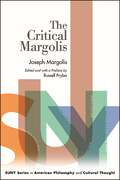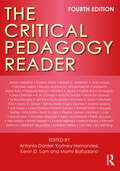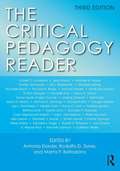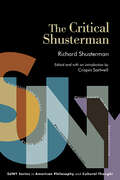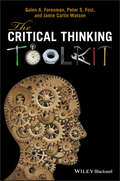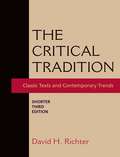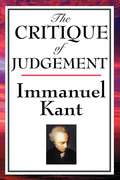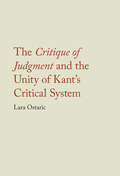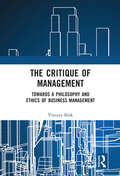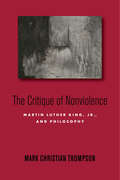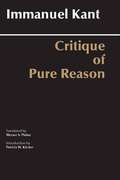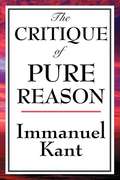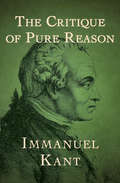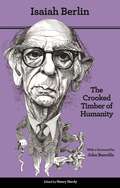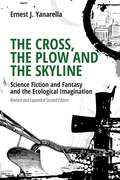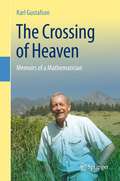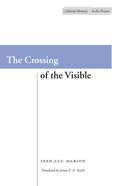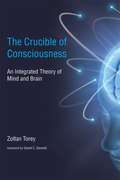- Table View
- List View
The Crisis of the European Mind: 1680-1715
by Anthony Grafton J. Lewis May Paul HazardPaul Hazard's magisterial, widely influential, and beloved intellectual history offers an unforgettable account of the birth of the modern European mind in all its dynamic, inquiring, and uncertain glory. Beginning his story in the latter half of the seventeenth century, while also looking back to the Renaissance and forward to the future, Hazard traces the process by which new developmentsin the sciences, arts, philosophy, and philology came to undermine the stable foundations of the classical world, with its commitment to tradition, stability, proportion, and settled usage. Hazard shows how travelers' tales and archaeological investigation widened European awareness and acceptance of cultural difference; how the radical rationalism of Spinoza and Richard Simon's new historical exegesis of the Bible called into question the revealed truths of religion; how the Huguenot Pierre Bayle's critical dictionary of ideas paved the way for Voltaire and the Enlightenment, even as the empiricism of Locke encouraged a new attention to sensory experience that led to Rousseau and romanticism. Hazard's range of knowledge is vast, and whether the subject is operas, excavations, or scientific experiments his brilliant style and powers of description bring to life the thinkers who thought up the modern world.
The Crisis of the Negro Intellectual Reconsidered: A Retrospective
by Jerry WattsThirty-five years after its initial publication, Harold Cruse's "The Crisis of the Negro Intellectual," remains a foundational work in Afro-American Studies and American Cultural Studies. Published during a highly contentious moment in Afro-American political life, "The Crisis of the Negro Intellectual" was one of the very few texts that treated Afro-American intellectuals as intellectually significant. The essays contained in Harold Cruse's "The Crisis of the Negro Intellectual Reconsidered" are collectively a testimony to the continuing significance of this polemical call to arms for black intellectuals. Each scholar featured in this book has chosen to discuss specific arguments made by Cruse. While some have utilized Cruse's arguments to launch broader discussions of various issues pertaining to Afro-American intellectuals, and others have contributed discussions on intellectual issues completely ignored by Cruse, all hope to pay homage to a thinker worthy of continual reconsideration.
The Crisis of the Officer Class: The Decline of the Tragic Sensibility (Sacred Order/Social Order #2)
by Philip Rieff<p>Philip Rieff earned recognition as one of the most profound social theorists of culture and authority of the twentieth century. Through such works as Freud: The Mind of the Moralist and The Triumph of the Therapeutic, he proved himself an incisive interpreter of Freud and his legacy. His work now culminates with the long-awaited trilogy, Sacred Order/Social Order, a three-volume work on social theory and contemporary culture. <p>In Volume 2, The Crisis of the Officer Class: The Death of the Tragic Sensibility, Phillip Rieff continues his assault against the deathworks of our modern age. Invoking his theory developed in Volume 1, he develops his critique of our current culture as distinguishable only by its rejection of any and all visions of sacred order.</p>
The Crisis of the Self in the Age of Information: Computers, Dolphins and Dreams (Routledge Revivals)
by Raymond BarglowFirst published in 1994, in The Crisis of the Self in the Age of Information Raymond Barglow shows how contemporary technological environment furnish the unconscious with internal objects that hark back to a time in our lives prior to personal boundary formation and identity. The consequence is that our technological involvements help to disrupt and dismantle the ideal of the unified and sovereign self that in the past technology fostered.Throughout the book Raymond Barglow interweaves critical theory and psychoanalysis with an examination of artistic representations, media imagery and dreams to explore the conflictual dynamics of contemporary self-information and self-representation. This book is an important work for scholars and researchers of philosophy, psychoanalysis, and clinical psychology.
The Crisis of the Twelfth Century: Power, Lordship, and the Origins of European Government
by Thomas N. BissonMedieval civilization came of age in thunderous events like the Norman Conquest and the First Crusade. Power fell into the hands of men who imposed coercive new lordships in quest of nobility. Rethinking a familiar history, Thomas Bisson explores the circumstances that impelled knights, emperors, nobles, and churchmen to infuse lordship with social purpose.Bisson traces the origins of European government to a crisis of lordship and its resolution. King John of England was only the latest and most conspicuous in a gallery of bad lords who dominated the populace instead of ruling it. Yet, it was not so much the oppressed people as their tormentors who were in crisis. The Crisis of the Twelfth Century suggests what these violent people—and the outcries they provoked—contributed to the making of governments in kingdoms, principalities, and towns.
The Critical Circle: Literature, History, and Philosophical Hermeneutics
by David Couzens HoyThe Critical Circle investigates the celebrated hermeneutic circle, especially as it manifests itself in historical inquiry and literary criticism. Formulated variously in different theories of hermeneutics, the circle generally describes how, in the process of understanding an interpretation, part and whole are related in a circular way: in order to understand the while, it is necessary to understand the parts, while to understand the parts it is necessary to have some comprehension of the whole. --from the Foreword This title is part of UC Press's Voices Revived program, which commemorates University of California Press’s mission to seek out and cultivate the brightest minds and give them voice, reach, and impact. Drawing on a backlist dating to 1893, Voices Revived makes high-quality, peer-reviewed scholarship accessible once again using print-on-demand technology. This title was originally published in 1982.
The Critical Ihde: Suny Series In American Philosophy And Cultural Thought (SUNY series in American Philosophy and Cultural Thought)
by Don IhdeDon Ihde is one of the world's foremost thinkers on the place of technologies in our lives. Over the course of a long career, he has built a unique and useful perspective by expanding on phenomenological and American pragmatist philosophy and has developed wide-ranging insights and conceptual tools for describing the details of our experience across the various areas of human activity, including scientific practice, anthropological history, computer interface, design, art history, and the technologies of everyday life. The Critical Ihde brings together many of Ihde's most influential writings, as well as a number of under-recognized gems. Across these works are examples of his influential contributions to the phenomenology of human auditory and visual experience, his foundational work on the phenomenology of technology, and his thoughts on the technologies of scientific practice, including laboratory and medical imaging. Further, these chapters reveal the development of "postphenomenology," Ihde's original philosophical perspective, one that continues to flourish today across the work of a growing interdisciplinary and international collective of scholars.
The Critical Margolis (SUNY series in American Philosophy and Cultural Thought)
by Joseph MargolisPragmatism's revival since 1980 can be credited to several thinkers, among them the longtime professor of philosophy at Temple University, Joseph Margolis. The Critical Margolis collects within one volume more than a dozen of his essential writings, allowing readers to become familiar with his important contributions to core areas of philosophy, where he has controversially challenged scientistic, analytic, and continental traditions. During a period when sharp divides animate intellectual debates—realism or idealism, matter or mind, causality or freedom, machines or persons, facts or values, cognition or emotion, and the like—Margolis dissolves false dichotomies and reconstructs philosophy itself. Prominent philosophers of the second half of the twentieth century, from Quine, Danto, and Putnam to Derrida, Rorty, and Brandom, along with a host of similarly significant thinkers, are targets of Margolis's critiques.If there could be a comprehensive volume of pragmatism for today and tomorrow, The Critical Margolis shall serve.
The Critical Pedagogy Reader
by Antonia Darder Kortney Hernandez Kevin D. Lam Marta BaltodanoSince its publication, The Critical Pedagogy Reader has firmly established itself as the leading collection of classic and contemporary essays by the major thinkers in the field of critical pedagogy. While retaining its comprehensive introduction, this thoroughly revised fourth edition includes updated section introductions, expanded bibliographies, and up-to-date classroom questions. The book is arranged topically around such issues as class, racism, gender/sexuality, language and literacy, and classroom issues for ease of usage and navigation. New reading selections cover topics such as youth activism, agency and affect, and practical implementations of critical pedagogy. Carefully attentive to both theory and practice, this new edition remains the definitive source for teaching and learning about critical pedagogy.
The Critical Pedagogy Reader (Third Edition)
by Rodolfo D. Torres Antonia Darder Marta P. BaltodanoFor fifteen years, The Critical Pedagogy Reader has established itself as the leading collection of classic and contemporary essays by the major thinkers in the field of critical pedagogy. While retaining its comprehensive introduction, this thoroughly revised third edition includes updated section introductions, expanded bibliographies, and up-to-date classroom questions. The book is arranged topically around issues such as class, racism, gender/sexuality, critical literacies, and classroom issues, for ease of usage and navigation. New to this edition are substantive updates to the selections of contemporary readings, including pieces that reflect issues such as immigrant and refugee students, the role of social justice in teacher education, and an emphasis on practical elements of pedagogy, as well as it significance to forging democratic life. Carefully attentive to theory and practice, this much-anticipated third edition remains the definitive, foundational source for teaching and learning about critical pedagogy.
The Critical Shusterman (SUNY series in American Philosophy and Cultural Thought)
by Richard ShustermanCollecting sixteen key texts on a broad range of key philosophical topics enables readers to perceive the scope of Shusterman's philosophy and appreciate its systematic aspects.Richard Shusterman is one of today's foremost philosophers. His influential and widely translated work is distinctive for its originality and its integration of multiple philosophical perspectives (analytic philosophy, phenomenology, hermeneutics, critical theory, and East Asian thought) to create a new transcultural pragmatist vision. Although most famous for his groundbreaking writings in aesthetics, somatic philosophy, and philosophy as an art of living, these texts are integrally connected with Shusterman's vital views on ontology, epistemology, and philosophy of mind, ethics, and politics. Collecting sixteen key texts on this broad range of topics, The Critical Shusterman enables readers to perceive the scope of Shusterman's philosophy and appreciate its systematic aspects. Editor Crispin Sartwell's superb introduction highlights those aspects in assessing Shusterman's thought in the context of contemporary philosophy while suggesting ways that Shusterman's project could be developed in the future.
The Critical Thinking Toolkit
by Peter S. Fosl Galen A. Foresman Jamie C. WatsonThe Critical Thinking Toolkit is a comprehensive compendium that equips readers with the essential knowledge and methods for clear, analytical, logical thinking and critique in a range of scholarly contexts and everyday situations. Takes an expansive approach to critical thinking by exploring concepts from other disciplines, including evidence and justification from philosophy, cognitive biases and errors from psychology, race and gender from sociology and political science, and tropes and symbols from rhetoric Follows the proven format of The Philosopher's Toolkit and The Ethics Toolkit with concise, easily digestible entries, "see also" recommendations that connect topics, and recommended reading lists Allows readers to apply new critical thinking and reasoning skills with exercises and real life examples at the end of each chapter Written in an accessible way, it leads readers through terrain too often cluttered with jargon Ideal for beginning to advanced students, as well as general readers, looking for a sophisticated yet accessible introduction to critical thinking
The Critical Tradition: Classic Texts and Contemporary Trends, Shorter Third Edition
by David H. RichterThis bestseller balances a comprehensive and up-to-date anthology of major documents in literary criticism and theory ― from Plato to the present ― with the most thorough editorial support for understanding these challenging readings.
The Critique of Judgment
by Immanuel Kant James Creed MeredithThis 1790 polemic by one of philosophy's most important and influential figures attempts to establish the principles that support the faculty of judgment. Kant's third critique -- after Critique of Practical Reason and Critique of Pure Reason -- remains one of the most important works on human reason. The Critique of Judgment informs the very basis of modern aesthetics by establishing the almost universally accepted framework for debate of aesthetic issues.<P><P> As in his previous critiques, Kant seeks to establish a priori principles. The first part of this work addresses aesthetic sensibility. The human response to specific natural phenomena as beautiful, he asserts, is a recognition of nature's harmonious order that corresponds to a mental need for order. The critique's second half focuses on the apparent teleology in nature's design of organisms. The philosopher declares that the mind is predisposed to find purpose and order in nature, and this predisposition forms the main principle underlying all our judgments. Although this could be interpreted as an argument in favor of a creator, Kant insists that a supernatural dimension or the existence of God cannot be proven -- such considerations lie beyond the realm of reason, solely within the province of faith.
The Critique of Judgment and the Unity of Kant's Critical System
by Lara OstaricIn this book, Lara Ostaric argues that Kant's seminal Critique of Judgment is properly understood as completing his Critical system. The two seemingly disparate halves of the text are unified under this larger project insofar as both aesthetic and teleological judgment indirectly exhibit the final end of reason, the Ideas of the highest good and the postulates, as if obtaining in nature. She relates Kant's discussion of aesthetic and teleological judgment to important yet under-explored concepts in his philosophy, and helps the reader to recognize the relevance of his aesthetics and teleology for our understanding of fine arts and genius, the possibility of pure judgments of ugliness, Kant's philosophy of history, his philosophy of religion, and his conception of autonomy. Ostaric's novel and thoroughly integrative presentation of Kant's system will be of interest not only to Kant scholars but also to those working in religious studies, art history, political theory, and intellectual history.
The Critique of Management: Towards a Philosophy and Ethics of Business Management
by Vincent BlokThis book reflects on the nature of business management to contribute to the development of a philosophy and ethics of management. It engages in conceptual engineering of management to delineate the phenomenon of management and, as a result, to open a new perspective on management beyond its self-evident conceptualization. After questioning the self-evident concept of management, the author develops a philosophy of management with six dimensions of the nature of management: management as participation; management as resistance and responsive action; management as constitution of meaning; management as politico-economic governance; management as non-reductive stakeholder engagement; and management as epistemic insufficient entrepreneurship. These six dimensions of management are taken as points of departure to develop an integrated concept of business ethics, an individual competence for ethical business management, and a concept of ethical codes for corporate social responsible behavior. This new conception of philosophy of management and business ethics can guide future philosophical and empirical work on the nature of management. The Critique of Management is an excellent resource for researchers, students, and professionals interested in philosophy of management, business ethics, and corporate social responsibility.
The Critique of Nonviolence: Martin Luther King, Jr., and Philosophy
by Mark Christian ThompsonHow does Martin Luther King, Jr., understand race philosophically and how did this understanding lead him to develop an ontological conception of racist police violence? In this important new work, Mark Christian Thompson attempts to answer these questions, examining ontology in Martin Luther King, Jr.'s philosophy. Specifically, the book reads King through 1920s German academic debates between Martin Heidegger, Rudolf Bultmann, Hans Jonas, Carl Schmitt, Eric Voegelin, Hannah Arendt, and others on Being, gnosticism, existentialism, political theology, and sovereignty. It further examines King's dissertation about Tillich, as well other key texts from his speculative writings, sermons, and speeches, positing King's understanding of divine love as a form of Heideggerian ontology articulated in beloved community. Tracking the presence of twentieth-century German philosophy and theology in his thought, the book situates King's ontology conceptually and socially in nonviolent protest. In so doing, The Critique of Nonviolence reads King's "Letter from a Birmingham Jail" (1963) with Walter Benjamin's "Critique of Violence" (1921) to reveal the depth of King's political-theological critique of police violence as the illegitimate appropriation of the racialized state of exception. As Thompson argues, it is in part through its appropriation of German philosophy and theology that King's ontology condemns the perpetual American state of racial exception that permits unlimited police violence against Black lives.
The Critique of Pure Reason
by Immanuel Kant Werner Pluhar James Ellington Patricia KitcherLike Werner Pluhar's distinguished translation of Critique of Judgment (Hackett Publishing Co. , 1987), this new rendering of Critique of Pure Reason reflects the elegant achievement of a master translator. This richly annotated volume offers translations of the complete texts of both the First (A) and Second (B) editions, as well as Kant's own notes. Extensive editorial notes by Werner Pluhar and James Ellington supply explanatory and terminological comments, translations of Latin and other foreign expressions, variant readings, cross-references to other passages in the text and in other writings of Kant, and references to secondary works. An extensive bibliography, glossary, and detailed index are included. Patricia Kitcher's illuminating Introduction provides a roadmap to Kant's abstract and complex argumentation by firmly locating his view in the context of eighteenth-century--and current--attempts to understand the nature of the thinking mind and its ability to comprehend the physical universe.
The Critique of Pure Reason
by Immanuel Kant J. M. D. MeiklejohnThe Critique of Pure Reason is one of the most influential philosophy books of all times. Kant's influence on modern perception of reason cannot be over estimated. Here Kant redefines reason and gives us the tools to understand reason on two levels: the empirical and the metaphysical.
The Critique of Pure Reason: In Commemoration Of The Century Of Its First Publication (Living Time World Thought Ser.)
by Immanuel KantImmanuel&’s Kant&’s groundbreaking work, considered to be among the most influential philosophical texts in the Western canon Familiar to philosophy students through the centuries, The Critique of Pure Reason is in many ways Kant&’s magnum opus. First published in 1781, it seeks to define what can be known by reason alone without evidence from experience. Kant begins by defining a posteriori knowledge, which is gained through the senses, versus a priori knowledge, or self-evident truths understood without the benefit of experience. He then examines these two types of knowledge in the context of analytic and synthetic judgments, using the relationship between them to conclude that through reason alone, humans are capable of reaching deep universal truths. Kant then demonstrates how—even as much of the world around us can never be truly known—the laws of the universe are in fact made possible by the human capacity for reason itself. Sparking intense and lasting discussion, The Critique of Pure Reason remains essential reading for anyone seeking a deeper understanding of the ideas that, since their initial publication, have gone on to shape much of Western philosophy. This ebook has been professionally proofread to ensure accuracy and readability on all devices.
The Crooked Timber of Humanity: Chapters in the History of Ideas - Second Edition
by Isaiah Berlin"Out of the crooked timber of humanity, no straight thing was ever made."--Immanuel Kant Isaiah Berlin was one of the most important philosophers of the twentieth century--an activist of the intellect who marshaled vast erudition and eloquence in defense of the endangered values of individual liberty and moral and political plurality. In The Crooked Timber of Humanity he exposes the links between the ideas of the past and the social and political cataclysms of our own time: between the Platonic belief in absolute truth and the lure of authoritarianism; between the eighteenth-century reactionary ideologue Joseph de Maistre and twentieth-century Fascism; between the romanticism of Schiller and Byron and the militant--and sometimes genocidal--nationalism that convulses the modern world. This new edition features a revised text that supplants all previous versions, a new foreword in which award-winning novelist John Banville discusses Berlin's life and ideas, particularly his defense of pluralism, and a substantial new appendix that provides rich context, including letters by Berlin and previously uncollected writings, most notably his virtuoso review of Bertrand Russell's A History of Western Philosophy.
The Cross, the Plow and the Skyline: Science Fiction and Fantasy and the Ecological Imagination (Revised and Expanded 2nd Edition)
by Ernest J. YanarellaThe apocalyptic, pastoral, and urban traditions have fundamentally shaped Western history and influenced American religion, culture, and politics. This book argues that these traditions have not only been decisive in giving form and substance to classic a
The Crossing of Heaven
by Karl Gustafson Ioannis AntoniouAmong the group of physics honors students huddled in 1957 on a Colorado mountain watching Sputnik bisect the heavens, one young scientist was destined, three short years later, to become a key player in America's own top-secret spy satellite program. One of our era's most prolific mathematicians, Karl Gustafson was given just two weeks to write the first US spy satellite's software. The project would fundamentally alter America's Cold War strategy, and this autobiographical account of a remarkable academic life spent in the top flight tells this fascinating inside story for the first time. Gustafson takes you from his early pioneering work in computing, through fascinating encounters with Nobel laureates and Fields medalists, to his current observations on mathematics, science and life. He tells of brushes with death, being struck by lightning, and the beautiful women who have been a part of his journey.
The Crossing of the Visible
by James Smith Jean-Luc MarionPainting, according to Jean-Luc Marion, is a central topic of concern for philosophy, particularly phenomenology. For the question of painting is, at its heart, a question of visibility--of appearance. As such, the painting is a privileged case of the phenomenon; the painting becomes an index for investigating the conditions of appearance--or what Marion describes as "phenomenality" in general. In The Crossing of the Visible, Marion takes up just such a project. The natural outgrowth of his earlier reflections on icons, these four studies carefully consider the history of painting--from classical to contemporary--as a fund for phenomenological reflection on the conditions of (in)visibility. Ranging across artists from Raphael to Rothko, Caravaggio to Pollock, The Crossing of the Visible offers both a critique of contemporary accounts of the visual and a constructive alternative. According to Marion, the proper response to the "nihilism" of postmodernity is not iconoclasm, but rather a radically iconic account of the visual and the arts that opens them to the invisible.
The Crucible of Consciousness
by Daniel C. Dennett Zoltan ToreyIn The Crucible of Consciousness, Zoltan Torey offers a theory of the mind and its central role in evolution. He traces the evolutionary breakthrough that rendered the brain accessible to itself and shows how the mind-boosted brain works. He identifies what it is that separates the human's self-reflective consciousness from mere animal awareness, and he maps its neural and linguistic underpinnings. And he argues, controversially, that the neural technicalities of reflective awareness can be neither algorithmic nor spiritual--neither a computer nor a ghost in the machine. The human mind is unique; it is not only the epicenter of our knowledge but also the outer limit of our intellectual reach. Not to solve the riddle of the self-aware mind, writes Torey, goes against the evolutionary thrust that created it. Torey proposes a model that brings into a single focus all the elements that make up the puzzle: how the brain works, its functional components and their interactions; how language evolved and how syntax evolved out of the semantic substrate by way of neural transactions; and why the mind-endowed brain deceives itself with entelechy-type impressions. Torey first traces the language-linked emergence of the mind, the subsystem of the brain that enables it to be aware of itself. He then explores this system: how consciousness works, why it is not transparent to introspection, and what sense it makes in the context of evolution. The "consciousness revolution" and the integrative focus of neuroscience have made it possible to make concrete formerly mysterious ideas about the human mind. Torey's model of the mind is the logical outcome of this, highlighting a coherent and meaningful role for a reflectively aware humanity.
